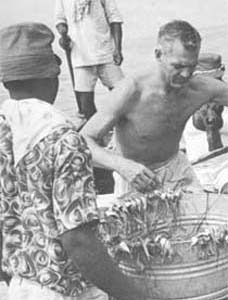
Brazil RPCV Joana Ramo writes "New Definition of “Patient Assistance Program” in Brazil"
New Definition of “Patient Assistance Program” in Brazil
By: Joana Ramos
Healthy Skepticism International News 2005 Jan; 23: 1
Abstract:
Joana Ramos of Seattle is an independent consultant in oncology social work. Also trained as a medical interpreter, she is a former resident of Brazil.
Joana Ramos, MSW
Cancer Resources & Advocacy
Seattle Washington USA
The term “ patient assistance program” (PAP) usually means a program whereby patients with limited resources and/or little or no insurance cover for prescription medicines, may receive a drug from the manufacturer at no or reduced cost. They are most common in the USA where no universal health system exists. Pharmas operating here like to boast of their generosity in offering PAPs, which usually require complex application procedures with rigid eligibility criteria. With effort, some patients do succeed in receiving medicines this way, and the existence of PAPs acts as yet another strategy of the drug companies to try to stave off governmental price controls. When Novartis gained FDA approval for Glivec (Gleevec in the USA) in May of 2001, company CEO Vasella went on public record saying the company was establishing both US and international versions of a PAP so that no patient in need of the drug ( for which a global price was set) would be denied access for financial reasons. The current scenario in Brazil which will be discussed in this article, is part of the larger picture of the convoluted and problematic access to a new cancer drug that is both revolutionary in its effectiveness and extraordinarily expensive.[1] The case of Glivec is a critical one to consider in terms of worldwide access to medicines.
Glivec PAP in Brazil
Novartis Brazil has put a whole new spin on the meaning of Patient Assistance Program ( PAP - conveniently this acronym happens to be equivalent in both Portuguese and English) with the creation of a so-called PAP for Glivec. in that country. The company website serves as the vehicle for informing physicians about this service being offered to their patients. I share with you here a synopsis in English of the company’s offering, (a copy of the original in Portuguese may be found at the end of the article) accompanied by commentary on the context of the program.
Author’s note: While preparing this article, access to the information about the Glivec PAP on the Novartis Brazil website underwent a change. Since I had last viewed the site on 12 August 2004, access to the PAP page has been restricted to only those providing their Brazilian medical professional registration data. Formerly the page was accessible on the public version of the site, www.glivec.com.br. By 25 August, I was only able to access it via Google’s cached version, as cited below.
The letter to physicians on the company website emphasizes how informing patients about the PAP will not only ensure that the patients’ psychosocial needs are met, but will result in better treatment outcomes. Physicians are urged to share this important information with patients already on Glivec as well as with newly-diagnosed patients for whom the treatment is being prescribed. The letter goes on to state that the support and caring that cancer patients need so much will be offered by the personnel of the Glivec hotline via a toll-free telephone number. However, no details are given about the training and credentials of those who will answer the calls, who are described as offering both treatment information and psychosocial support to patients.
All that the doctors need to do is to give the patient a copy of their prescription for Glivec along with a special “PAP Glivec” card which looks like a credit card and is supplied by the Novartis drug reps. (An image is shown on the webpage). The patient, in turn, needs to fax the prescription to Novartis, and then call the hotline to provide their personal information and contact details for their physician. After the data is verified and the patient is registered in the PAP, a special Glivec Patient Information Kit, consisting of a tote bag, educational video, and a brochure will be sent to the patient’s home. Registered patients may then call the hotline to get answers to their questions about treatment with Glivec and possible side effects.
DTCA of prescription drugs is strictly prohibited in Brazil,[2] and promotional materials and advertising may only be directed to physicians, and in some cases, to pharmacists. Therefore there is an incentive to pharma to find other ways of reaching consumers, hence the format and rationale of this pitch for a “PAP Glivec.”
In other words, through this web-based advertising campaign, Novartis gains direct access to patients and attempts to generate good-will and build brand loyalty among them. The patient gets nothing besides a cloth tote bag, the video and brochure, and a phone number to call with questions. It is as yet unclear how this promotion stands in terms of Brazil’s legal prohibition of DTCA. Theoretically, it might be rationalized that since the “PAP” targets only patients to whom Glivec has been prescribed, it is not technically advertising to the “public.” However, if a patient used the tote bag in public, then it might be considered to be a form of advertising. A legal opinion would be needed to evaluate whether Novartis is violating the intent of the law.
Some background
This PAP offering is quite interesting in view of the history of Glivec approval in Brazil and the continuing problems that patients are having in accessing medication in that country. In 2001, when Glivec was being considered for inclusion into Brazil’s NHS (Sistema Unica de Saude or SUS) formulary after its approval by the national drug regulatory agency (Agencia Nacional de Vigilancia Sanitaria, or ANVISA) , accusations were made that Novartis funded and manipulated patient groups to lobby on its behalf to the health ministry, which was engaged in a battle with Novartis over the price of Glivec. Glivec was eventually included in the SUS formulary after the Health Ministry negotiated a price it was willing to accept. The lowered price does not reflect a true discount, but instead an exemption of Glivec from certain import taxes. The 2004 price at which SUS buys Glivec is pegged at approximately $25 USD per 100mg capsule.[3]
The bulk of the Brazilian patients who must depend on SUS for their healthcare, however, not infrequently experience difficulty in receiving Glivec, which is often out of stock at treatment centers around the country. At some public hospitals in southern states (where access generally has been better) the problem has recently been exacerbated by a series of apparently well-planned armed robberies of pharmacies, by thieves specifically demanding that all Glivec supplies be turned over. Authorities speculate that the stolen Glivec is intended for international black markets, as the hospitals’ own patients are receiving the drug at no charge.[4]
Some Brazilian patients have been successful in their quest for Glivec only by filing and winning civil lawsuits against their respective SUS facility. This tactic has been successful, of course, only among the most system-savvy and well-educated.[5] And because Glivec has been approved for the SUS formulary, Brazilian patients are not eligible to participate in the Novartis GIPAP offering. (GIPAP being the Glivec International Patient Assistance Program).
Glivec is not the first drug for whose promotion Novartis has sought to cultivate special relationships with patients in Latin America, although the instances have rarely been reported in the English-language media. Another example is that of cyclosporine, Unitl 1999, Novartis was the sole manufacturer of cyclospsorine ( inherited from Sandoz), a costly anti-rejection drug needed by organ and tissue transplant patients. When generic versions began appearing in 2000, Novartis not only contested their manufacturers’ production rights, but also approached kidney transplant patient groups in Brazil, Costa Rica, and Mexico with offers of education programs and financial support. Patient groups in these countries soon were beseeching their governments to continue to supply them with the Novartis product, citing as evidence studies later shown to be suspect, that the generics were not of the same efficacy.[6]
Present & Future
Despite Brazil’s unresolved socioeconomic and health inequalities, the sheer size of its population and its degree of economic activity, make it a prime market for the multinational pharmas. With increasing levels of education and income, especially in the more populated and prosperous Central-South region, consumer awareness of modern cancer treatments has grown. Brazil is said to be the 9th largest global market for medicines.[7] Novartis and others are also wary of the potential of Brazil’s thriving generic industry (and at the same time preparing to bolster its own generic market share in Brazil),[8] its resurgent popular community activism, and the government’s willingness to exercise its political muscle in the health arena, as seen by its actions on AIDS drugs. The decision by Novartis to withdraw support for an international tropical disease research institute being planned for Manaus, and switch it to Singapore instead, was seen as direct retaliation for the Brazilian government’s breaking of patents on HIV drugs as a positive public health measure.[9] And in a contradictory ideological twist, the recent revelation of a major scandal in Brazil’s Health Ministry, has led to the disclosure that Novartis , among other pharmas, made sizeable campaign contributions to now-President Luis” Lula” Inacio da Silva in 2002, motivated by the desire to defeat contender José Serra, who as Health Minister, who had challenged Novartis over the price of Glivec as a condition for its approval in Brazil.[10]
With a PAP, like this, it remains to be seen just what kind of genuine assistance will be available for Brazilian patients who need Glivec or other imported drugs to treat cancer and other deadly diseases.














